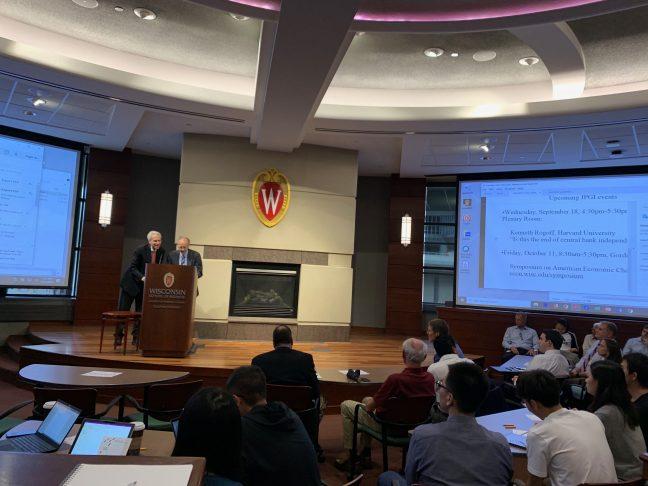University of California-San Diego economics professor James Hamilton spoke about the difficulty of predicting the next recession Wednesday night for The State of the Economy annual presentation.
Hamilton explained the difference between short-term and long-term bonds, or investments. In a short-term bond, the user invests a certain amount of money and receives their return sooner, but it may not be as much money as if they’d invested in a long-term bond and received a return after a longer period of time. Hamilton said, historically, as portrayed by a graph that economists call a yield curve, a long-term bond should yield more than a short term bond.
Hamilton said when this is not the case, the yield curve becomes inverted, which could be used as an indicator of a recession, as the yield curve has inverted before prior recessions.
“Before each one of those historical recessions, we got into this episode where the yield curve was inverted,” Hamilton said.
Marginalized identities face opportunity gaps after college, according to experts
Hamilton said the current inversion of the yield curve is concerning, but because economic relationships constantly shift, it becomes difficult to make predictions based solely on the yield curve. Hamilton also shared two prediction models that point to the possibility of a recession.
Hamilton said he remains skeptical of prediction models which claim the absolute certainty of an upcoming recession.
Walker cannot claim recovery from Great Recession when racial disparities run rampant
Hamilton examined several other indicators of economic health, including new claims for unemployment insurance, an increased number of Americans working, the Institute for Supply Management manufacturing purchasing managers index, and the price of oil. Out of these indicators, Hamilton only showed a slight concern for the trends in the ISM manufacturing purchasing managers index, as it indicates a decrease in manufacturing. Hamilton said this decrease could be due to the current trade war with China.
“There are some signs here of weakness in manufacturing,” Hamilton said. “And we may know the reason for that. It’s related to some of these concerns about what’s going on with the world trade situation, affecting our manufacturers.”
Hamilton said the economy recesses after a series of executive mistakes, and if those in the White House knew their actions might directly cause a recession, they would change their course.
Hamilton concluded anyone can predict a recession in the next two years and have a 43% chance of being right as long as they have a large sample size, but this doesn’t mean there’s an impending recession.
“When they tell you for sure there’s going to be a recession over the next year or the next two years, that might be right,” Hamilton said. “But in my view, nobody knows that for sure.”

















